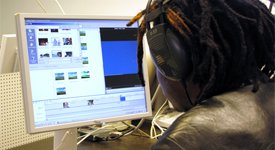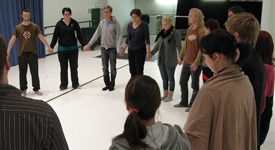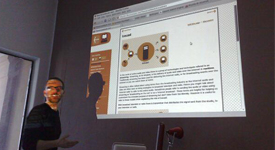MediosOur communication culture is becoming ever more interactional due to the new, social ways of using the Internet. Ever more often the user of the net also acts as content provider and distributor in the media. Medios was created to support this change; it offered tools for exploiting the new media in, for example, teaching, creative social content production, and in supporting participation and the chance to affect. Medios was a cooperation project between Helsinki Metropolia University of Applied Sciences, Helsinki City Theatre and m-cult centre for new media culture, and its goal was to promote the social media skills of cultural, educational and welfare actors. Medios developed various working methods using participatory media; these methods were then tested in practice by both professionals and amateurs. In addition to increasing knowledge, the goal of the project was to improve the skills in using the tools of social media and thus offer, for example, teachers and educators practical tools to be used in their everyday work. Medios, implemented between 2008 and 2011, was coordinated by Metropolia. It was partially funded by the European Social Fund and the Uusimaa Centre for Economic Development, Transport and the Environment. Three subprojects were implemented underneath the Medios umbrella: collaborative scriptwriting tool Noodi, production project FLOSS Manuals for open source code software manuals and audiovisual storytelling method Digitales. During the project, these methods were improved and developed on the basis of experiences, while professionals were trained in using them. Medios involved plenty of workshops and concrete exercises. Professionals were trained in using the tools developed in Medios in their work. Development and educational work was performed with, for example, teachers, trainers and professionals in social services and welfare. The project also involved the users of various tools on a regular basis, such as library customers or young people who had writing as a hobby. As Medios ends, use of the tools developed during the project will continue and increase. Those having participated in the training during the project will continue to exploit their skills in their work and share their skills and knowledge with customers and trainees. In addition, the developed tools and methods are freely available online for anyone interested in using them. Â
Digitales – show your story!Digitales, or Digital Storytelling, is a method using still photos, music and/or speech to compose a few-minute audiovisual presentation on a computer. Originally the method was used to tell personal stories and memories. This project expanded the potential for use to cover the strengthening of social participation, the increase of chances for social affecting, as well as educational purposes. During the project, digital storytelling workshops were organized for educators, such as teachers and employees in social services and libraries. They can then use the method with their customers and students. Helsinki Metropolia University of Applied Sciences was responsible for the Digitales subproject. Examples can be found online: The Center for Digital Storytelling community (www.storycenter.org), the European Digitales project (www.digi-tales.org) and on these websites (some of them are in English). A presentation video available here. Â
Noodi – log in and write!Noodi is a social online writing tool meant especially for creative scriptwriting. With Noodi, more than one participant at a time can work on the same versatile text package. A group of adolescents used the tool to write a play called Free Hugs, which was performed in Studio Pasila in Helsinki in the fall of 2010. A dramaturge teacher was guiding the writing process. The subproject was implemented by Helsinki City Theatre and Helsinki Metropolia University of Applied Sciences. Noodi tool is available online at http://noodi.metropolia.fi. Â
Flossmanuals – own the open tools!FLOSS Manuals is an international network producing manuals for open source software. Free/Libre, Open Source Software (FLOSS) refers to computer programs which are free to be developed by all those who are capable and freely available for all users. This kind of software offers excellent alternatives for the closed software by major software corporations. FLOSS Manuals supports new users by providing clear instructions for installing the software and for various purposes of use. FLOSS Manuals subproject was implemented by m-cult centre for new media culture. The project produced open source manuals in Finnish, as well as organized workshops where the open tools were applied to community media. The manual library has been published at http://fi.flossmanuals.net. |
|
|




